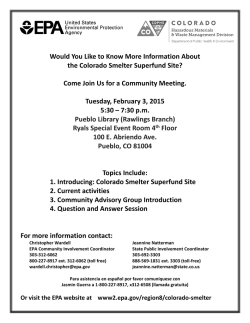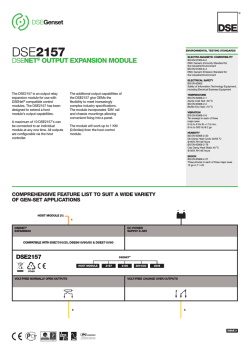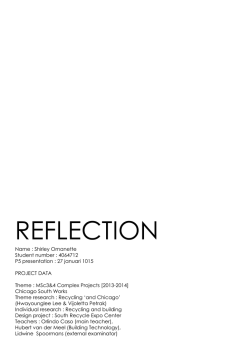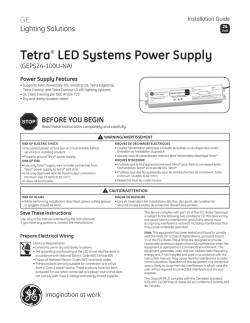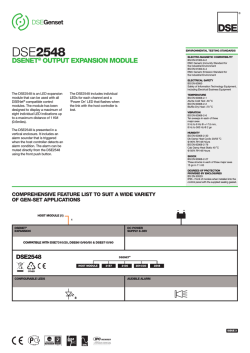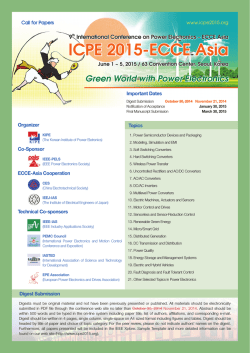
ppt - Electrical Engineering and Computer Science
Ethics, the Environment and Computer Engineering • This lecture is quite different than any I’ve ever given – It covers largely non-technical material – It involves a lot my opinions on non-technical subjects. • That’s something not overly comfortable with • Please don’t think you need to agree with me • Topics are: – The Environment and the impact Computer Engineering has on it. • I use, nearly verbatim and with permission, a presentation given by a senior in one of my classes. – Ethics in a number of contexts • Workplace ethics • Intellectual property laws Warning • I’m (again) discussing three topics that each could (and is) their own class (or major, or profession) – This time I’m not overly qualified in the area… – And I’ve got 30 minutes! By Jake McCrary What is electronic waste? Why is it a problem? What is being done about e-waste? Lead vs. Lead free American definition ◦ Anything with a PCB or slightly complicated electronic components European ◦ Anything with a plug More than 4.6 million tons of electronic waste (e-waste) was produced in the US in the year 2000 [Bhuie] ◦ EPA has it that we disposed of 2.4 million tons in 2012. In Europe, quantity of e-waste increases 3 to 5% a year [Bhuie] ◦ 3 times larger growth than other waste growth Electronics are becoming more and more a part of everyday life Embedded systems are every place ◦ Microwaves, printers, key fobs, cars, appliances, cell phones Electronics becoming disposable Cell phones ◦ Life span is about 1.5 years now ◦ 130 million are retired a year ◦ Over 500 million are stockpiled [Bhuie] Computers ◦ 20 million retired a year ◦ 240 million already stockpiled [Bhuie] Estimated that for every new cell phone or computer one becomes obsolete [Bhuie] Hazardous materials found in electronics ◦ Examples: Arsenic, Beryllium, Cadmium, Nickel, Zinc, Antimony, Lead ◦ Can cause damage to brain, lungs, and other organs ◦ Lead especially toxic to developing children [Jackson] Hazardous materials not only found in electronic components Toxins are found in the plastics ◦ Brominated flame-retardants (BFR) added to plastics to reduce chance of fire ◦ Damage to sexual development and growth attributed to some BFRs [Jackson] Recycling programs Many programs try to refurbish and sell old equipment Programs in place to mine precious metals from old equipment Computer companies have started recycling programs ◦ Some charge fee ◦ Some give customers rebates on new products Cell Phone recycling ◦ Largest programs are Verizon’s Hopeline and Wireless Foundation’s Donate-a-Phone programs Cell phone rates of recycling appear to be at 8% in the US in 2009. [EPA] ◦ One study had it at 70% in the world in 2004. PCs are 38% by EPA ◦ 10% worldwide by the same study in 2004. Cost (US $) Collection Transportation Sorting Dismantling Refining Disposal of non-hazardous Disposal of hazardous Cell Phone 6.00 0.35 0.03 0.32 0.01 PC 23.50 0.43 3.50 2.75 7.87 0.83 0.03 5.00 Bhuie, A. K., O. A. Ogunseitan, et al. (2004). High cost of labor for recycling Outsource to China ◦ Cheap labor ◦ Laws are less strict City of Guiyu: e-waste hub of world ◦ Drinking water has to be brought in [Johnston] ◦ Horrible working conditions [Grossman] ◦ Studies show problems in workers from recycling [Grossman] Natalie Behring, www.nataliebehring.com Natalie Behring, www.nataliebehring.com Natalie Behring, www.nataliebehring.com There is a lot of money to be had processing electronic waste Chinese government trying to come up with system Laws have been passed Electronics companies taking some responsibility in making sure waste handled properly [Johnston] Poor conditions not only overseas Federal Prison Industries (UNICOR) run electronic waste processing in prisons [Jackson] ◦ The Department of Justice’s Inspector General in 2010 found: Numerous violations of health, safety, and environmental laws and regulations “Gross misconduct” by staff working for the Federal Prison Industries, also known as UNICOR. [ETB] Some take old equipment and pass on to schools and nonprofits Others mine for metals 950 e-waste processors in North America 700 million dollar industry in 2003 [Grossman] Estimated that by 2010 the industry will have $3.5 billion dollars in revenue [Grossman] ◦ 30 to 50% circuit is made of metal [Grossman] ◦ 400 to 500 in the United States [Grossman] Two directives have been passed ◦ Waste Electrical and Electronic Equipment (WEEE) ◦ Restrictions of the Use of Certain Hazardous Substances (RoHS) Move responsibility of end of life impact to producer (“producer responsibility”) [Tetra Tech] Producers responsible for collection, treatment, and disposal of e-waste [Tetra Tech] Logos must be placed on products alerting customers not to throw away in normal trash [Tetra Tech] Provide list of materials in products to recyclers [Tetra Tech] The name is fitting Restricts: ◦ Lead, mercury, hexavalent chromium, cadmium, and some brominated flame retardants [Tetra Tech] ◦ If there is no alternative you can use the above Every 4 years review to see if you can stop using restricted substance [Grossman] Has a large impact on electronics [Mueller] Lead is used in practically everything Getting rid of lead clearly makes end of life better [Mueller] Yet some environmentalists are opposed to lead ban SnAgCu is common replacement to SnPb US EPA finds that SnAgCu has greater environmental impact on: ◦ ◦ ◦ ◦ ◦ Non-renewable resources Energy use Water Quality Ozone depletion Global Warming Per 1000 cc of solder, lead free uses an energy equivalent of 162 gallons more of gasoline [United States EPA] Increased environmental impact comes from material and process related issues [United States EPA; Mueller] Metals used are more costly to extract [Mueller] Melting point is higher which results in more energy use [Mueller] Tin based solders form whiskers [Mueller] Improvements cannot be made to impact of lead at end of life Processes used to produce and use lead free solder could be improved Forcing lead free could force companies to come up with recycling friendly designs to reduce cost Electronics are becoming more and more of part of everyday life New legislature is forcing electronic industry to pay attention to environmental impact It is unsure if such laws are beneficial Tetra Tech. (2005). "Factsheet: WEEE and RoHS Directives." Retrieved 10/21, 2006, from http://www.mdsmap.com/en/pdf/weee%20rohs%20directive%20factsheet.pdf. Bhuie, A. K., O. A. Ogunseitan, et al. (2004). Environmental and economic trade-offs in consumer electronic products recycling: a case study of cell phones and computers. Electronics and the Environment, 2004. Conference Record. 2004 IEEE International Symposium on, 10-13 May 2004, Page(s): 74 – 79 Grossman, E. (2006). High tech trash: digital devices, hidden toxics, and human health. Washington, Island Press/Shearwater Books. Jackson, A. S., A. Shuman, et al. (2006). "Toxic Sweatshops: How UNICOR Prison Recycling Harms Workers, Communities, the Environment, and the Recycling Industry." Retrieved 10/22, 2006, from http://www.computertakeback.com/docUploads/ToxicSweatshops.pdf. Johnston, B. R. (2003). "The Political Ecology of Water: An Introduction " Capitalism, nature, socialism 14(3): 73 - 90. Mueller, J., H. Griese, et al. (2005). Transition to lead free soldering - a great change for a better understanding of materials and processes and green electronics. United States. Environmental Protection Agency. (2005). "Solders in electronics a life-cycle assessment." Retrieved 10/20, 2006, from http://www.epa.gov/opptintr/dfe/pubs/solder/lca/lfs-lca-final.pdf. http://www.electronicstakeback.com/global-e-waste-dumping/prisonrecycling/investigation-finds-workers-exposed-to-heavy-metals/ http://www.epa.gov/epawaste/conserve/materials/ecycling/manage.htm Now onto Ethics What are “ethics”? ◦ “book” definition of ethics a system of principles governing morality and acceptable conduct a major branch of philosophy, encompasses right conduct and good living. It is significantly broader than the common conception of analyzing right and wrong the study of values - good and bad, right and wrong But…. That sounds pretty removed from day-today activities ◦ What I’m looking for is: 1. How do I figure out the “right” thing to do? 2. How do I decide if it’s important to do it? What’s “right” (this is hard!) Some working definitions ◦ Greatest Good for the Greatest Number Utilitarianism, Jeremy Bentham ◦ Some form of the Golden Rule “If you want others to be happy, practice compassion. If you want to be happy, practice compassion” – Dalai Lama …do to others what you would have them do to you… -- Bible Lots more... ◦ An it harm none, do what ye will Wiccan Rede ◦ If it feels right, it probably is “…the well known elephant test. It is difficult to describe, but you know it when you see it.” -- Lord Justice Stuart-Smith “When the Gentiles who have not the law do by nature what the law requires, they are a law to themselves even though they have not the law. They show that what the law requires is written on their hearts.” -- Bible So? I personally think that what’s right is written into us ◦ Maybe by culture, maybe by genes, maybe by a creator I go with the “To Catch a Mockingbird” philosophy. ◦ Put yourself in the shoes of all the people involved and you can figure out what is right. Please notice, this is still (oddly) different than what to actually do. Even more oddly, each of us may reach a different conclusion. This would seem to be a killer to my philosophy, but… Example from my professional life Catch a student cheating on a project ◦ Options: Send them to the honor council Honor Council if they want, otherwise zero on the project Ignore it And the closely associated, “don’t look for it” strategy. ◦ Who are the players who’s views I need to consider? What do they think and how does this impact them? ◦ So what’s right? Potential example from your personal life You really want an internship from Google. ◦ But Google is being annoying and not getting back to you. (You suspect they aren’t interested) ◦ Microsoft has offered you an internship, but you need to respond to them before Google is going to get back to you. So you take the Microsoft job And of course, three days later, Google offers you an internship. ◦ What’s right? ◦ What to actually do? …and what to do. This is quite a bit harder. ◦ I think knowing the right thing is usually fairly easy. Its weighing it against other commitments (to yourself and others) that’s hard. ◦ If your death could save two random people elsewhere in the world It’s pretty clear that dying would be the right thing But it’s a lot less clear that’s what you (or I) would actually do, or should do. So…I don’t have any great insights. Best I’ve got is an engineer’s solution ◦ Look at it from all possible viewpoints Being sure to think hard about who all the players are. ◦ Don’t be cavalier about these issues In my experience unethical behavior often comes from not taking the time to think things through ◦ “Do no harm” is a good minimum for an engineer. Anything that causes harm not only has ethical issues, there are almost always legal issues. Next lecture: Mostly on CS/CE/EE stuff. ◦ What the programs are, how they relate to what we’ve done in 100 etc. ◦ Some examples of cool EECS topics Error correction, signal processing, etc. Also a short bit on intellectual property. ◦ Reading assignment: “Right to Read” https://www.gnu.org/philosophy/right-to-read.html 252 team1 nbusuito troychen aparnasr 252 team2 amodepal scschwa shikev 252 team3 aanant beqid achiwha varunk Stay 252 team4 adapa nitinram kishbrao tanvirs Stay 252 team5 lyuchen marksja ojhasata psturm Stay 254 team6 shuvro jxliu tmazer kjwa Dow 1014 254 team7 henryjc alassman kmilka scbridge Dow 1014 254 team8 bacheung ahrisue tiberiu Dow 1014 254 team9 bbabbs prospecs parkjack cschmotz Dow 1014 254 team10 dahdunn hanjason asofian sosaluis Dow 1014 256 team11 sahilg sschmatz thorrez zboyang Dow 1014 256 team12 dbruni muelliot msegedin vsubra Dow 1014 256 team13 conjam sguan mccabequ ydtak Stay 256 team14 jeremyng hbrendan jpmorrow vaishr Stay 256 team15 smousigi nbtavis henwang kevwolf Cooley G906 258 team16 ahouse tongyliu bwzhang kevzhao Cooley G906 258 team17 saadk znofzing maypifer edstan Cooley G906 258 team18 gcheydle skimkim niechris jmpat Cooley G906 258 team19 dimabond ajglass mikkatz alexwass Cooley G906 258 team20 danjchoi grladd sthmprrn tmrupp Cooley G906 snavraj brinday Stay Stay One of the most important legal (and perhaps ethical issues) of the day is something greatly important to Computer Scientists How to treat “intellectual property” Creations of the mind - creative works or ideas embodied in a form that can be shared or can enable others to recreate, emulate, or manufacture them. There are four ways to protect intellectual property - patents, trademarks, copyrights or trade secrets http://www.uspto.gov/main/glossary/index.html How much control the creator of the IP should have over it’s use Both extremes (None and Complete) are seriously argued by serious people. Natural Law The creator should have control of their creation Economics With control comes the ability to make money. Thus people are more likely to make things people want ▪ Benefit to society as a whole ▪ See “Invisible Hand”, Adam Smith The more control, the more money, the more created, the more the benefit to society. Natural Law IP can’t be “owned” in the same sense as a sandwich. ▪ If others make a copy of your information, you still have it. ▪ If the IP is, say, a cure for cancer, shouldn’t it be freely available to all with cancer? ▪ Why protect something that’s worth less than that? Economics Society benefits by the free flow of information. ▪ Seeing what others have done, and freely being able to use it, enriches new creations. ▪ If someone hides information (trade secret, copyright) then we get a duplication of effort. Person (or company) who is creating these “creations of the of the mind” Others Those who might benefit from these creations Those who might suffer from IP restrictions “Society” This is distinct from “others” in both arguments, so should be kept separate. The first codification of intellectual property can be traced to the Jewish laws in the Talmud (200 CE), which declared a prohibition against "Gnevat daat" - literally the theft of ideas. http://www.nysun.com/article/22289?page_no=3 Use of the term IP appears to start around 1845. But the notion has been around for a while “To promote the Progress of Science and useful Arts, by securing for limited Times to Authors and Inventors the exclusive Right to their respective Writings and Discoveries.” ▪ Article I, Section 8, Clause 8 of the United States Constitution, Patents in the modern sense originated in Italy in 1474.[12] At that time the Republic of Venice issued a decree by which new and inventive devices, once they had been put into practice, had to be communicated to the Republic in order to obtain the right to prevent others from using them. ▪ Wikipedia For patent law, there are a number of balances/limits on control Limited times (14-20 years) Must disclose idea to patent it ▪ And patent is published For copyright A term consisting of the life of the author and 70 years after the author's death. ▪ Recently increased in a retroactive way No disclosure required Fair use In the story, what are the issues of IP that arise? Is this believable? Two questions What to do What should be done
© Copyright 2026
